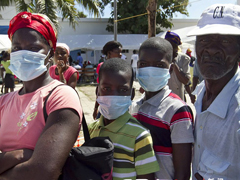UN peace-keeping troops under cholera fire in Haiti
United Nations peace-keeping troops in Haiti are coming under heavy fire, accused of causing the dangerous cholera outbreak that has so far claimed almost 1,000 lives in the poor and troubled Caribbean nation.
 |
|
[CFP] |
On Monday (November 15), crowds of Haitians converged on and threw stones at camps housing UN troops, forcing the peacekeepers to fire back with dispersal tear gas.
Fingers started being pointed at the Nepalese troops in Haiti after a top US Federal health agency, the Centre for Disease Control and Prevention (CDC) claimed that the strain of cholera found in Haiti "resembled" one prevalent in Nepal.
On November 1, the CDC said in a public statement that "Haitian cholera patients had all been infected with the same strain" which, it added, "closely resembles a South Asian strain."
Since then, the UN Peacekeeping Force and UN Relief Agency officials have been coming under increased public pressure from Haitians already affected by the massive January 2010 landslide that took over 250,000 lives.
The UN said in Haiti and New York that it had investigated the allegations that excrement from Nepalese peacekeepers caused the epidemic, but the tests taken from the peacekeepers' camp and adjacent waters were found to be negative.
The UN was not the only one in doubt about the origin of the cholera strain found in Haiti.
After the October outbreak and the CDC's claims were publicised, Haiti's Health Minister, Dr Alex Larsen, said it was "unlikely" that the disease originated in the country.
"Although these results indicate that the strain is non-Haitian, cholera strains may move between different areas due to global travel and trade," he told the press at the time.
Dr Larsen said the strain was "probably transmitted by contaminated food or water, or an infected person," but he concluded that it was "unlikely the outbreak's origin would ever be known."
Last Friday, the UN estimated that it would cost over US $163 million to treat the epidemic over the next year. It is seeking donor funding for the full amount and promises that $89 million will be used for sanitation and hygiene.
But there are doubts that the money needed will be pledged or delivered by donors with the speed needed to check the quickly spreading disease.
 0
0 








Go to Forum >>0 Comments